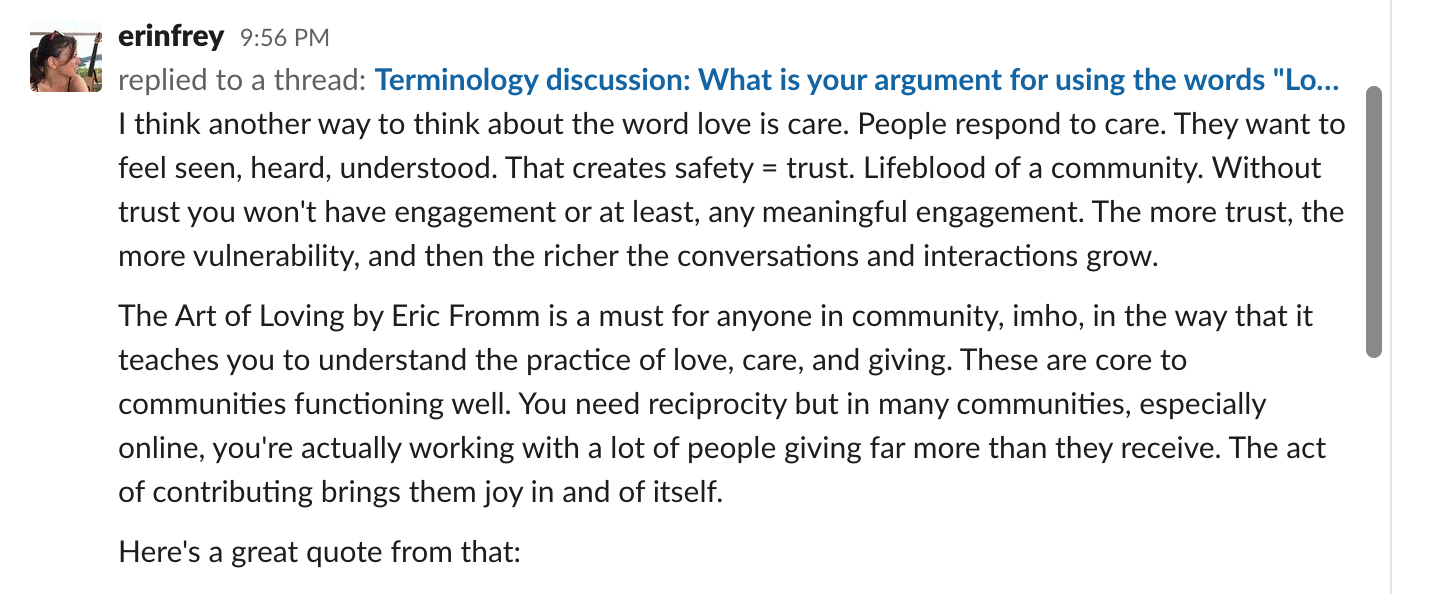Love is the currency that drives community
A community member weighs-in on love, care, trust, and the Orbit Model.

Erin Frey
July 1, 2020
This article is a lightly edited transcript of a conversation in our Slack community, where we discuss community building, the Orbit Model, and our product.
Community member Erin Frey’s response was prompted by a question from another member about why the Orbit Model uses the terms “Love” and “Reach”, as opposed to terms like "Engagement" and "Influence."
We thought Erin made some important points about the essence of community building, and she kindly agreed to us sharing her thoughts here.
— Patrick

Loving is caring
I think another way to think about the word love is care. People respond to care. They want to feel seen, heard, understood—that creates safety, and safety = trust, the lifeblood of a community. Without trust you won't have engagement or at least, any meaningful engagement.
The more trust, the more vulnerability, and then the richer the conversations and interactions grow.
I feel like trust and safety are increasingly important, and we’re seeing their lack accelerate things like heated conversations online. I’m at least seeing this in my FB/online communities given the increasing uncertainty I think is in everyone’s lives—we’re all a bit jumpier and more reactive.
The Art of Loving by Erich Fromm is a must for anyone in community, in my humble opinion, in the way that it teaches you to understand the practice of love, care, and giving. These are core to communities functioning well.
You need reciprocity, but in many communities, especially online, you're actually working with a lot of people giving far more than they receive. The act of contributing brings them joy in and of itself.
Here's a great quote from that:
“What does one person give to another? He gives of himself, of the most precious he has, he gives of his life. This does not necessarily mean that he sacrifices his life for the other—but that he gives him of that which is alive in him; he gives him of his joy, of his interest, of his understanding, of his knowledge, of his humor, of his sadness—of all expressions and manifestations of that which is alive in him.
In thus giving of his life, he enriches the other person, he enhances the other's sense of aliveness by enhancing his own sense of aliveness. He does not give in order to receive; giving is in itself exquisite joy. But in giving he cannot help bringing something to life in the other person, and this which is brought to life reflects back to him.”
Community as escape from the status quo
I think another key aspect of online community building is community as an escape from modernity/capitalism/the status quo. Many people see their communities—and even escape to them—as a way to live their more complex, richer, more authentic experiences than, say, their 9-5 job. Fromm also positions love as a counter to that in his theory.
I know it can come across as hokey but in my humble opinion, love is the most accurate and crispest word to describe the currency that drives any community.
I do agree that love isn't easy to describe to marketing teams or anyone in a business setting. It is helpful in understanding strategy around community building. My strategy for implementation is to just use whatever term(s) the people I need to convince use for "care." For a developer, I imagine they would express care through their code and effort and it's reflected in the quality of their work. So when talking about how to build community, I'd use those as examples and maybe try to find terms that reflect how developers show care or feel valued/appreciated in their work.
Why not “engagement” or “influence”?
The words engagement and influence, to me, can feel inauthentic since they’ve been overused and sometimes misused in corporate settings.
Yes, we all have to make money, and profit reflects the value in one way - but it obfuscates the real value people get out of the community-related parts of work or interactions, even when they’re related to selling or marketing products: the intrinsic value it brings to the person.
So, that’s why I like that Orbit uses these more direct, if touchy/feely/hippy terms like love and reach.
---
Thanks again to Erin for sharing her perspective.
These thoughts will be incorporated into the Orbit Model documentation on GitHub soon. Please consider starring the repo and following along on Twitter for updates.
You might also like:
- Why Orbit is Better Than Funnel for Developer Relations
- DevRel teams need tools and models created specifically for our discipline, and not just those adopted from other fields.
- Slack vs Discord vs Discourse: The best tool for your community
- An in-depth comparison of 3 top community platforms across dozens of factors.
- How we use Orbit to build Orbit
- A guide to how we use our product to build our community.

